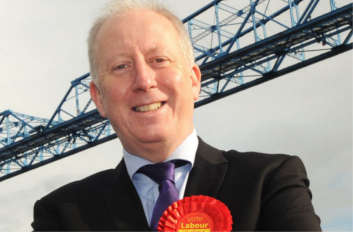The income train operating companies (TOCs) made from compensation events has increased by £45m more than the compensation paid out to passengers, reigniting debate over the fairness of the system.
According to Network Rail’s annual accounts for 2017/18, compensation paid to TOCs for both planned and unplanned disruption to services increased by £52m. The total figure will be announced shortly but will be hundreds of millions, based on figures from previous years.
This is compared to the additional £7m paid to passengers during the year and is equivalent to two-thirds of the £80m total compensation to passengers.
The news comes on the day the transport watchdog revealed that rail passenger satisfaction has hit its lowest level for a decade and prompted Labour to accuse rail firms of ‘squeezing compensation out of Network Rail to fuel their profits’.

Andy McDonald MP
The extra £52m includes both ‘Schedule 4’ payments, which cover planned engineering works, and payments under ‘Schedule 8’, which covers disruption caused by signalling or track problems, bridge strikes or the weather.
Controversy all over again
The revelation has reignited the controversy over the disparity between payments to TOCs, particularly under Schedule 8, and that paid as compensation to passengers.
In 2016, the then rail minister, Claire Perry told MPs: ‘Money is flowing into those train companies, and it should be flowing out to all passengers who are entitled to compensation.’
In language that echoes Ms Perry’s remarks, Network Rail’s chief financial officer, Jeremy Westlake, wrote: ‘Network Rail has suffered through Schedule 8 outflows due to performance issues, an increase in incursions onto the railway and adverse weather.’
Shadow transport secretary Andy McDonald told Transport Network: ‘This is a yet another reminder of the deeply flawed incentives at work within the rail industry. Train companies would sooner devote resources to squeezing compensation out of Network Rail to fuel their profits rather than improve the punctuality and reliability of their services for passengers.
‘The policies of successive Conservative governments have done nothing to address this structural failure. Only Labour’s plans for public ownership of rail can deliver the right structure for rail which protects the interests of passengers and taxpayers.’
However, the Rail Delivery Group, which represents train companies and Network Rail, defended the system. A spokesperson said: ‘These payments are overseen by the rail regulator which says that they keep costs down for taxpayers and farepayers, and they are completely separate from the money customers rightly receive for delays.
‘The payments compensate train operators for lost revenue when fewer people travel due to disruption and they encourage rail companies to work together to improve punctuality. When things go wrong we want to make it easy for customers to claim the compensation they deserve, and industry efforts have helped the number of claims to increase by 80% over the last two years.’
The figures pre-date the timetable chaos last spring but do cover major upgrades such as the August 2017 Waterloo upgrade.
Network Rail has declined to state how much cash it paid under Schedule 4 to the previous operator, South West Trains, or to South Western Railway, which took over the franchise during the works, on the grounds that this is ‘commercially sensitive information for the operators’.
Data published by the Department for Transport (DfT) shows that TOCs paid passengers a total of £80.7m in 2017/18, up from £73.6m in 2016/17. The latest figures include £17m paid to South West Trains and £1.4m to South Western Railway – approximately a quarter of the total.
A DfT spokesperson told Transport Network that the South West Trains figure includes the cost of passenger claims under their Passenger’s Charter for the Waterloo works, including discounts for season ticket holders.
Network Rail has told Transport Network that firms that unilaterally cancel services on the grounds that this will ‘minimise disruption’ resulting from a problem with the network can still claim under Schedule 8.
Last winter South Western Railway, which had suffered serious weather-related disruption in Dorset, was criticised by watchdog Transport Focus after it pre-emptively shut down all services in anticipation of bad weather.
Transport Network understands that Network Rail will publish data imminently showing the Schedule 4 and Schedule 8 compensation respectively it paid to TOCs in 2017/18, broken down by company.
Network Rail data for 2016/17 shows that it paid rail firms a total of £482m in 2016/17, comprising £301m under Schedule 4 and £181m through Schedule 8. However, the data also shows that Access Charge Supplements paid by rail firms, described as an ‘insurance premium’ for Schedule 4 protection totalled £224m during the year.
Register now for full access
Register just once to get unrestricted, real-time coverage of the issues and challenges facing UK transport and highways engineers.
Full website content includes the latest news, exclusive commentary from leading industry figures and detailed topical analysis of the highways, transportation, environment and place-shaping sectors.
Use the link below to register your details for full, free access.
Already a registered? Login